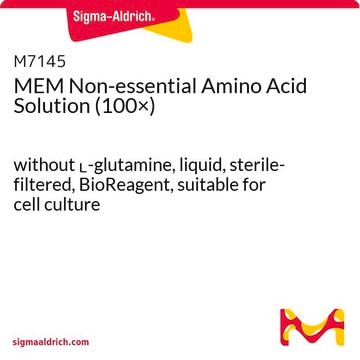59202C
Solution de L-glutamine 200 mM
29.23 mg/mL in saline, solution, suitable for cell culture
Fabrication pharma
Synonyme(s) :
L-glutamine solution
About This Item
Produits recommandés
Niveau de qualité
Description
for research or for further manufacturing use
Stérilité
sterile; sterile-filtered
Forme
solution
Technique(s)
cell culture | mammalian: suitable
Composants
L-glutamine: 29.23 mg/mL
Conditions d'expédition
dry ice
Température de stockage
−20°C
Chaîne SMILES
N[C@@H](CCC(N)=O)C(O)=O
InChI
1S/C5H10N2O3/c6-3(5(9)10)1-2-4(7)8/h3H,1-2,6H2,(H2,7,8)(H,9,10)/t3-/m0/s1
Clé InChI
ZDXPYRJPNDTMRX-VKHMYHEASA-N
Vous recherchez des produits similaires ? Visite Guide de comparaison des produits
Description générale
Code de la classe de stockage
12 - Non Combustible Liquids
Classe de danger pour l'eau (WGK)
WGK 1
Point d'éclair (°F)
Not applicable
Point d'éclair (°C)
Not applicable
Certificats d'analyse (COA)
Recherchez un Certificats d'analyse (COA) en saisissant le numéro de lot du produit. Les numéros de lot figurent sur l'étiquette du produit après les mots "Lot" ou "Batch".
Déjà en possession de ce produit ?
Retrouvez la documentation relative aux produits que vous avez récemment achetés dans la Bibliothèque de documents.
Les clients ont également consulté
Articles
Importance and uses of glutamine in hybridoma and mammalian cell culture
Importance and uses of glutamine in hybridoma and mammalian cell culture
Importance and uses of glutamine in hybridoma and mammalian cell culture
Importance and uses of glutamine in hybridoma and mammalian cell culture
Notre équipe de scientifiques dispose d'une expérience dans tous les secteurs de la recherche, notamment en sciences de la vie, science des matériaux, synthèse chimique, chromatographie, analyse et dans de nombreux autres domaines..
Contacter notre Service technique










